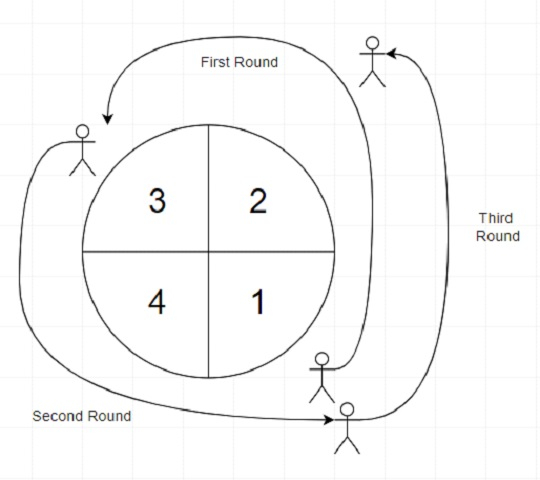
 Data Structure
Data Structure Networking
Networking RDBMS
RDBMS Operating System
Operating System Java
Java MS Excel
MS Excel iOS
iOS HTML
HTML CSS
CSS Android
Android Python
Python C Programming
C Programming C++
C++ C#
C# MongoDB
MongoDB MySQL
MySQL Javascript
Javascript PHP
PHP
- Selected Reading
- UPSC IAS Exams Notes
- Developer's Best Practices
- Questions and Answers
- Effective Resume Writing
- HR Interview Questions
- Computer Glossary
- Who is Who
Program to find most visited sector in a circular track using Python
Suppose we have a number n and an array called rounds. We have a circular track which consists of n different sectors labeled from 1 to n. Now consider a race will be held on this track, the race consists of m different rounds. The ith round starts at sector rounds[i - 1] and ends at sector rounds[i]. For example, if the round 1 starts at sector rounds[0] and ends at sector rounds[1]. So we have to find the most visited sectors sorted in ascending order. (The track numbers are in ascending order of sector numbers in the counter-clockwise direction)
So, if the input is like n = 4 rounds = [1,3,1,2], then the output will be [1, 2]

because the race starts from sector 1. The order of the visited sectors is as follows: [1,2,3 (end of first round),4,1 (end of second round), 2 (end of 3rd round)]. Here both of the sectors 1 and 2 are visited twice and they are the most visited sectors. And sectors 3 and 4 are visited only once.
To solve this, we will follow these steps −
d := a new map
-
for j in range 1 to n, do
d[j] := 0
d[rounds[0]] := 1
-
for i in range 1 to size of rounds - 1, do
-
if rounds[i] > rounds[i-1], then
-
for j in range rounds[i-1]+1 to rounds[i]+1, do
d[j] := d[j] + 1
-
-
otherwise,
-
for j in range rounds[i-1]+1 to n, do
d[j] := d[j] + 1
-
for j in range 1 to rounds[i], do
d[j] := d[j] + 1
-
-
curr := d[rounds[0]]
out := [rounds[0]]
-
for i in range 1 to n, do
-
if i is not same as rounds[0], then
-
if d[i] > curr, then
curr := d[i]
out := [i]
-
otherwise when d[i] is same as curr, then
append i with out
-
-
return out after sorting
Example (Python)
Let us see the following implementation to get better understanding −
def solve(n, rounds):
d = {}
for j in range(1,n+1):
d[j] = 0
d[rounds[0]] = 1
for i in range(1, len(rounds)):
if rounds[i] > rounds[i-1]:
for j in range(rounds[i-1]+1, rounds[i]+1):
d[j] += 1
else:
for j in range(rounds[i-1]+1,n+1):
d[j] += 1
for j in range(1,rounds[i]+1):
d[j] += 1
curr = d[rounds[0]]
out = [rounds[0]]
for i in range(1,n+1):
if i != rounds[0]:
if d[i] > curr:
curr = d[i]
out = [i]
elif d[i] == curr:
out = out + [i]
return(sorted(out))
n = 4
rounds = [1,3,1,2]
print(solve(n, rounds))
Input
4, [1,3,1,2]
Output
[1, 2]

